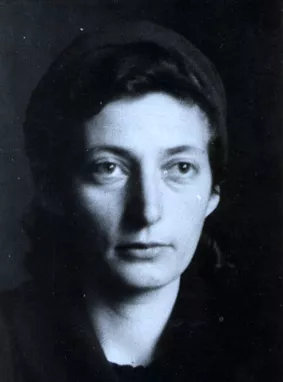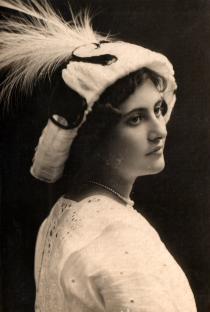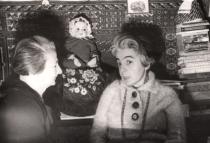This is me. The picture was taken in Moscow in 1943.
Ib 1938 after graduation Moscow Foreign Languages Institute I was allocated to Obninsk [about 100 km to the south from Moscow], to the orphanage, where children of Spanish anti-fascists stayed.
Obninsk was a hick town, though picturesque. Some of my fellow students left with me there. We settled in the hostel. Our life there was tedious and monotonous.
My father died in 1938. I worked in orphanage for half a year. Then I was offered a job in French chair of Moscow Foreign Languages Institute, I graduated from.
It took pains to be lodged in the institute hostel. The hostel looked like a wooden barrack, located in the outskirts of Moscow. Then I decided to move my mother to Moscow from Sevastopol.
Mother stayed by me the whole time. She shared all my tribulation and worries. We survived war in the hostel, and it always was easier for me as my dear person was close to me.
We had lived in the hostel with one shower on the floor and toilet, at the end of the corridor, one common kitchen with two gas cookers, cockroaches and rats until 1977.
On 22 June, 1941 the war was unleashed. My mother and I stayed in Moscow during war. In October 1941, when Germans came close to Moscow, people started panicking and fleeing from the city.
The rector of our institute was gone, he must have escaped the city, too. Our institute was not evacuated, even during constant bombing and when Germans approached the city.
The winter of 1941 was very severe. We were cold and hungry. Transport did not work very well in Moscow. We had to walk back home from work, because at that time there was no transportation to the outskirts where our hostel was located.
I received lunch in the institute canteen and carried it home in a pot to my mother. The hostel in the city center was vacant, and my mother and I moved there. There was electricity and heating there, besides it was in close vicinity to the institute, so I did not have to walk long distance.
Some other teacher found a place for themselves in that hostel. There were not a lot of teachers who stayed in Moscow. Our neighbors in the hostel were very interesting and civil people.
The Latin teacher lived next to us. He was very pleasant and intellectual person. I also made friends with the family of French teacher Katsovich.
In 1932 he came here from France. I especially enjoyed having a chat with his wife Maria Tok, who also came from France. She worked as a translator. We had very scarce food. Mother tried to make some variety, and changed things for provision. It was very cold.
Students sat in the coats during classes. I went to the markets near Moscow to buy warm clothes, but my trips were not always successful. I was robbed of the purchased things or my money was stolen.
Mother learnt how to type and I had odd jobs typing.
My mother typed for some employers of our institute, and they highly appreciated her job, since she was a literate typist.
At the end of 1941 our institute was replenished with new people. There were two institutes of foreign languages in Moscow.
One of them was closed down, so the teachers and students came
to our institute to study and teach.
There were many interesting and good teachers. Gradually institute life revived in Moscow.


































